Channels
Special Offers & Promotions
JPK Instruments AG
Products
Contact JPK Instruments AG
All articles from JPK Instruments AG
JPK Reports on the use of STM to Study Surface Plasmons in the Molecular Science Group at ISMO
Feb 22, 2017
JPK Instruments reports on the use of their NanoWizard AFM system at the University of South Australia, Adelaide
Jul 28, 2016
JPK Reports on the Use of the NanoWizard 3 AFM System at the Hebrew University of Jerusalem
May 8, 2015
JPK reports on the use of optical tweezers in the Schieber Research Group at Illinois Institute of Technology
Mar 18, 2015
JPK Opens New Expanded Offices in Berlin to Meet the Growing Demand for Products Worldwide
Feb 3, 2015
JPK Reports on the Use of the NanoWizard AFM System for Force Measurements at Monash University
Jun 18, 2014
JPK Reports on the Use of Quantitative Imaging Mode of the NanoWizard 3 at Niigata University
May 8, 2014
JPK reports on the use of the ForceRobot system to study the dynamics of biomacromolecules at Nanjing University
Mar 27, 2014
JPK reports on the use of Quantitative Imaging, QI, for the study of living bacteria at the Universit
Aug 6, 2013
JPK reports on the 5th NanoBioVIEWS International Symposium on the application of Optical Tweezers in Life Sciences
Jul 14, 2013
JPK reports on single molecule research at IISER Pune in India using AFM and CellHesion techniques
Jun 11, 2013
JPK reports on the first images of DNA's double helix in the molecule's natural environment
Aug 30, 2012
JPK reports on the research activities of Dr Jochen Guck and his teams at Dresden & Cambridge Universities
May 18, 2012
The Nanoscopy Group of Dr Volker Deckert applies JPK platform of optical technologies in the development of TERS
Sep 29, 2011
The University of Leipzig adds JPK's CellHesion 200 capability to enhance cell-cell force measurements
May 10, 2011
JPK's latest annual International Meeting on SPM & Optical Tweezers for Life Sciences is a big success
Nov 10, 2010
User benefits of broad accessory range offering unlimited possibilities delivered by JPK Instruments
Oct 20, 2010
JPK announces the annual two day International Meeting on the application of SPM & Optical Tweezers for Life Sciences
Jul 21, 2010
JPK Instruments sponsors the German Museum of Masterpieces of Technology and Science in Munich
Dec 8, 2009
Media Partners


 JPK Instruments, a world-leading manufacturer of nanoanalytic instrumentation for research in life sciences and soft matter, reports on how the Nano Imaging Lab of the Swiss Nanoscience Institute uses JPK’s versatile NanoWizard® 4 AFM system. Dr Monica Schönenberger has developed a flexible, professional service unit for atomic force microscopy. As a member of the Swiss Nanoscience Institute (SNI)...
JPK Instruments, a world-leading manufacturer of nanoanalytic instrumentation for research in life sciences and soft matter, reports on how the Nano Imaging Lab of the Swiss Nanoscience Institute uses JPK’s versatile NanoWizard® 4 AFM system. Dr Monica Schönenberger has developed a flexible, professional service unit for atomic force microscopy. As a member of the Swiss Nanoscience Institute (SNI)...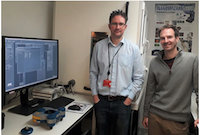 JPK Instruments reports on the research of Professor Guillaume Charras of the London Centre for Nanotechnology where he is applying AFM to understand the fundamental mechanical properties of cells and tissues. Professor Guillaume Charras leads a research group at the London Centre for Nanotechnology. Their overall goal is to understand fundamental mechanical properties of cells and tissues...
JPK Instruments reports on the research of Professor Guillaume Charras of the London Centre for Nanotechnology where he is applying AFM to understand the fundamental mechanical properties of cells and tissues. Professor Guillaume Charras leads a research group at the London Centre for Nanotechnology. Their overall goal is to understand fundamental mechanical properties of cells and tissues...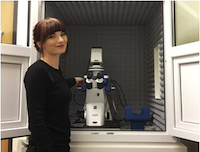 JPK Instruments, a world-leading manufacturer of nanoanalytic instrumentation for research in life sciences and soft matter, reports on the research of Professor Luisa Mestroni's research laboratory which specializes in the study of genetics of cardiac muscle diseases. They use the JPK NanoWizard® AFM to help the characterization of cardiomyopathies......
JPK Instruments, a world-leading manufacturer of nanoanalytic instrumentation for research in life sciences and soft matter, reports on the research of Professor Luisa Mestroni's research laboratory which specializes in the study of genetics of cardiac muscle diseases. They use the JPK NanoWizard® AFM to help the characterization of cardiomyopathies......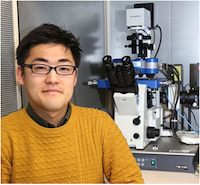 JPK Instruments, a world-leading manufacturer of nanoanalytic instrumentation for research in life sciences and soft matter, reports on the research of Professor Taiji Adachi which uses the JPK NanoWizard® AFM to understand the mechanical basis of mechanotransduction at...
JPK Instruments, a world-leading manufacturer of nanoanalytic instrumentation for research in life sciences and soft matter, reports on the research of Professor Taiji Adachi which uses the JPK NanoWizard® AFM to understand the mechanical basis of mechanotransduction at...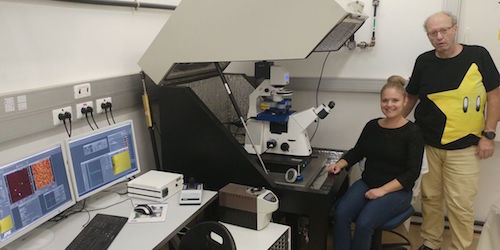
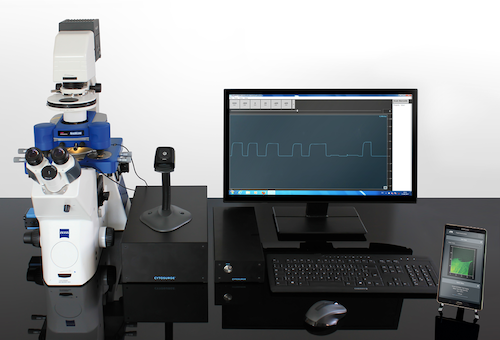 The partnership makes Cytosurge's FluidFM technology available on the JPK NanoWizard AFM platform.
The partnership makes Cytosurge's FluidFM technology available on the JPK NanoWizard AFM platform.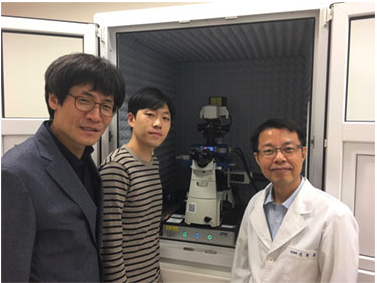 JPK Instruments reports on the exciting research of the Kim Group in the Structural Biology Laboratory of the Sungkyunkwan University School of Medicine, (SKKU), Suwon, South Korea using JPK's NanoWizard® ULTRA Speed AFM to study the binding of transcription factor Sox2 with super enhancers.
JPK Instruments reports on the exciting research of the Kim Group in the Structural Biology Laboratory of the Sungkyunkwan University School of Medicine, (SKKU), Suwon, South Korea using JPK's NanoWizard® ULTRA Speed AFM to study the binding of transcription factor Sox2 with super enhancers. 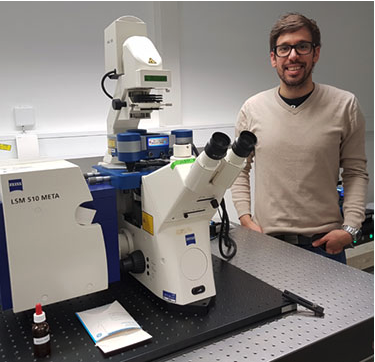 Dr Henri Franquelim is a Post Doc researcher at the Max Planck Institute of Biochemistry situated near Munich. He is a member of Professor Petra Schwille's research team whose goal is to quantitatively understand the essence and core principles of living systems...
Dr Henri Franquelim is a Post Doc researcher at the Max Planck Institute of Biochemistry situated near Munich. He is a member of Professor Petra Schwille's research team whose goal is to quantitatively understand the essence and core principles of living systems...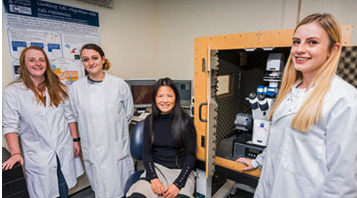 They are studying cells and how they react with their surroundings using JPK's NanoWizard® AFM and CellHesion® module. Professor Huabing Yin is a senior lecturer in the Division of Biomedical Engineering at the University of Glasgow.....
They are studying cells and how they react with their surroundings using JPK's NanoWizard® AFM and CellHesion® module. Professor Huabing Yin is a senior lecturer in the Division of Biomedical Engineering at the University of Glasgow.....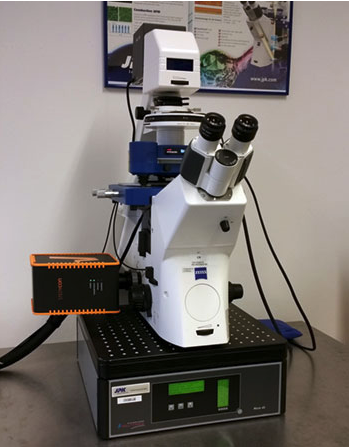 In collaboration with Abberior Instruments, visitors to JPK's applications facility will be able to see STED capability demonstrated in conjunction with the NanoWizard® AFMs. Following collaboration with Abberior Instruments (Göttingen, Germany), visitors to JPK's facility in Berlin will now be able to see a demonstration of STED capability....
In collaboration with Abberior Instruments, visitors to JPK's applications facility will be able to see STED capability demonstrated in conjunction with the NanoWizard® AFMs. Following collaboration with Abberior Instruments (Göttingen, Germany), visitors to JPK's facility in Berlin will now be able to see a demonstration of STED capability....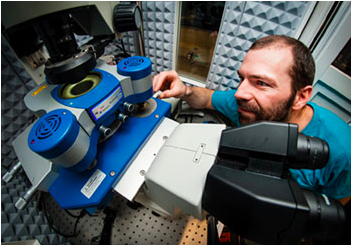 Dr Nic Mullin is a senior experimental officer in the SPM Group of Professor Jamie Hobbs in the Department of Physics & Astronomy at the University of Sheffield. His research is based around instrument development for scanning probe microscopy for the study of soft matter and biological systems at the molecular scale....
Dr Nic Mullin is a senior experimental officer in the SPM Group of Professor Jamie Hobbs in the Department of Physics & Astronomy at the University of Sheffield. His research is based around instrument development for scanning probe microscopy for the study of soft matter and biological systems at the molecular scale....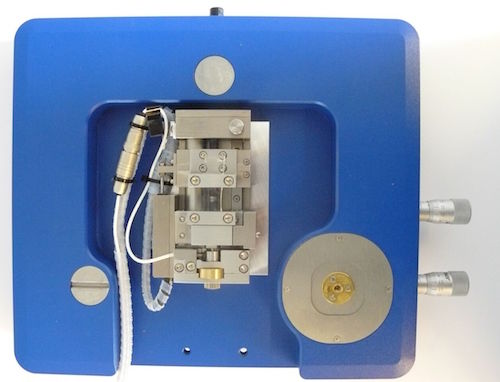 Dr Torsten Mueller is a member of the development team with German nanoscience instrument makers, JPK Instruments. Dr Mueller and his colleagues are based in Berlin supporting a worldwide user network which is continuously testing JPK with requests for new capabilities for their life science and materials nanoscience systems....
Dr Torsten Mueller is a member of the development team with German nanoscience instrument makers, JPK Instruments. Dr Mueller and his colleagues are based in Berlin supporting a worldwide user network which is continuously testing JPK with requests for new capabilities for their life science and materials nanoscience systems....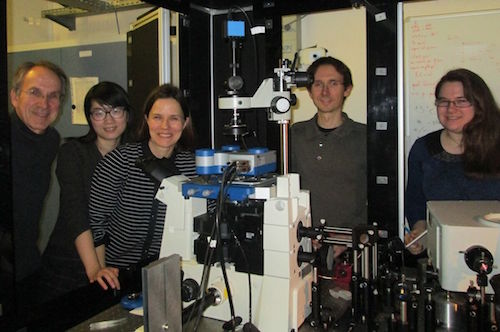 One of the research goals of the Molecular Nanoscience Group at ISMO is to work towards circuits and devices in which surface plasmons (not electrons or photons) are used to transfer and manipulate information. However, why develop plasmonics when there are already solutions using electronics and photonics?....
One of the research goals of the Molecular Nanoscience Group at ISMO is to work towards circuits and devices in which surface plasmons (not electrons or photons) are used to transfer and manipulate information. However, why develop plasmonics when there are already solutions using electronics and photonics?....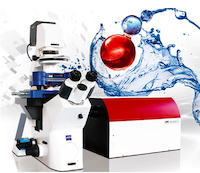 Based on years of leadership in the fields of atomic force microscopy and optical tweezers for applications in nanotechnology for life science, JPK have brought the technologies together on a single inverted light microscope platform. The OT-AFM Combi-System pairs the exceptional surface force measurement and imaging capabilities of AFM with the ability of optical tweezers to apply and measure smallest forces in 3D....
Based on years of leadership in the fields of atomic force microscopy and optical tweezers for applications in nanotechnology for life science, JPK have brought the technologies together on a single inverted light microscope platform. The OT-AFM Combi-System pairs the exceptional surface force measurement and imaging capabilities of AFM with the ability of optical tweezers to apply and measure smallest forces in 3D....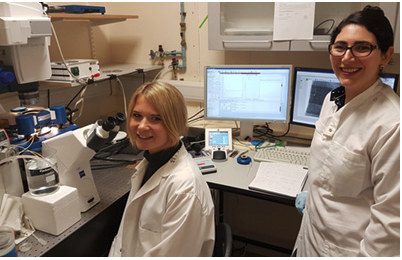 Dr Kristian Franze is a lecturer in the Department of Physiology, Development and Neuroscience at the University of Cambridge. His major goal is to understand when, where and how mechanical signals, such as forces and local tissue stiffness, are involved in controlling cell development and function in the nervous system....
Dr Kristian Franze is a lecturer in the Department of Physiology, Development and Neuroscience at the University of Cambridge. His major goal is to understand when, where and how mechanical signals, such as forces and local tissue stiffness, are involved in controlling cell development and function in the nervous system....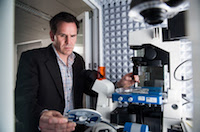 AFM is being applied to many areas including smart wound healing, plant toxicology and novel methods of nanoparticle characterization. Dr Gordon McPhee is head of production for NextCell Pty in Adelaide, Australia. Situated on the Mawson Lakes Campus, he is located next to the University of South Australia (UniSA), Australia's leading university for interdisciplinary research, where he has access to their...
AFM is being applied to many areas including smart wound healing, plant toxicology and novel methods of nanoparticle characterization. Dr Gordon McPhee is head of production for NextCell Pty in Adelaide, Australia. Situated on the Mawson Lakes Campus, he is located next to the University of South Australia (UniSA), Australia's leading university for interdisciplinary research, where he has access to their...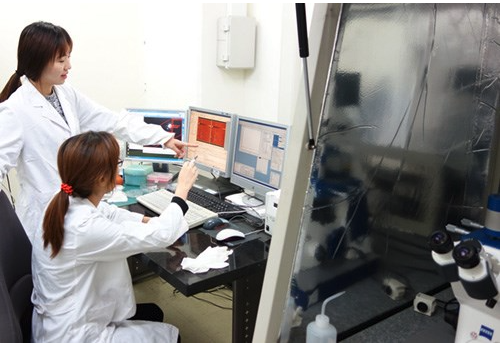 They are being applied to the field of medical diagnostics. Professor Joon Won Park is head of the Supersensitive Molecular Laboratory at Korea's Pohang University of Science & Technology. His group's research goal is to bring AFM into the field of medical diagnostics. It is their belief that AFM is the most sensitive tool for detecting various biomarkers without amplification or labelling. Reliability and speed have been...
They are being applied to the field of medical diagnostics. Professor Joon Won Park is head of the Supersensitive Molecular Laboratory at Korea's Pohang University of Science & Technology. His group's research goal is to bring AFM into the field of medical diagnostics. It is their belief that AFM is the most sensitive tool for detecting various biomarkers without amplification or labelling. Reliability and speed have been...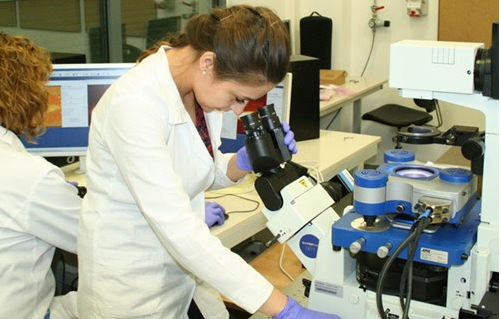 Dr Marek Szymonski is a Professor at the Research Centre for Nanometer-Scale Science and Advanced Materials (NANOSAM) located at the Jagiellonian University in Krakow, Poland. The aim of his research is to understand the signals that govern intracellular communication between hepatocytes and liver sinusoidal endothelial cells (LSECs) and between cardiomyocytes and cardiac microvascular endothelial cells...
Dr Marek Szymonski is a Professor at the Research Centre for Nanometer-Scale Science and Advanced Materials (NANOSAM) located at the Jagiellonian University in Krakow, Poland. The aim of his research is to understand the signals that govern intracellular communication between hepatocytes and liver sinusoidal endothelial cells (LSECs) and between cardiomyocytes and cardiac microvascular endothelial cells...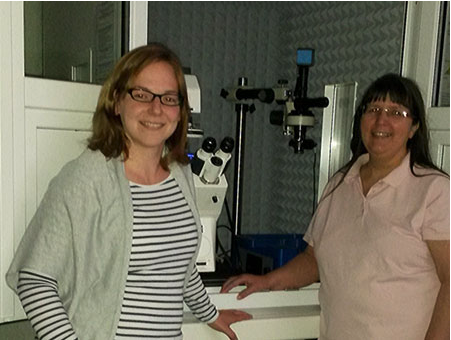 Dr Christine Müller-Renno is a member of the Ziegler Group in the Physics Department at the University of Kaiserslautern in Germany. The main topics of their research are in nano- and microelectronics, as well as in medical engineering and fluid analysis. Other topics include catalysts and stain-resistant coatings by the use of nanomaterials. The Group uses the JPK NanoWizard® AFM to study the...
Dr Christine Müller-Renno is a member of the Ziegler Group in the Physics Department at the University of Kaiserslautern in Germany. The main topics of their research are in nano- and microelectronics, as well as in medical engineering and fluid analysis. Other topics include catalysts and stain-resistant coatings by the use of nanomaterials. The Group uses the JPK NanoWizard® AFM to study the...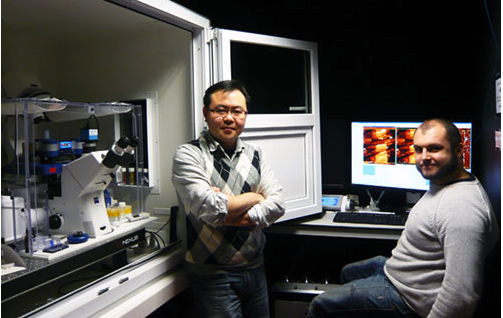 Dr Luning Liu leads a research group at the Institute of Integrative Biology at the University of Liverpool. Using interdisciplinary approaches, the Liu Lab aims to explore the molecular mechanism underlying the self-assembly, dynamics and regulation of biological membranes and macromolecular protein complexes. The long-term goal of the group is to understand the physiological adaptation of cellular metabolisms in...
Dr Luning Liu leads a research group at the Institute of Integrative Biology at the University of Liverpool. Using interdisciplinary approaches, the Liu Lab aims to explore the molecular mechanism underlying the self-assembly, dynamics and regulation of biological membranes and macromolecular protein complexes. The long-term goal of the group is to understand the physiological adaptation of cellular metabolisms in... Dr Yoko Yamanishi is an Associate Professor in the Department of Mechanical Engineering at Shibaura Institute of Technology, Tokyo, Japan. She leads the Yamanishi Laboratory - the Micro-nano Functional Fluid Laboratory. The Laboratory's goals aim to clarify unknown function of cells by using micro-nano technology based on mechanical, electrical and bio-medical engineering. It targets a contribution to the development of cellular scale...
Dr Yoko Yamanishi is an Associate Professor in the Department of Mechanical Engineering at Shibaura Institute of Technology, Tokyo, Japan. She leads the Yamanishi Laboratory - the Micro-nano Functional Fluid Laboratory. The Laboratory's goals aim to clarify unknown function of cells by using micro-nano technology based on mechanical, electrical and bio-medical engineering. It targets a contribution to the development of cellular scale...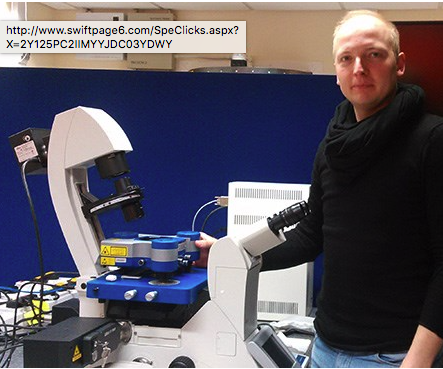 The Weatherall Institute of Molecular Medicine (WIMM) at Oxford University comprises various groups involved in molecular medicine research forming a “Research Hotel.” They all come from different medical departments and also different topics (immunology, haematology, oncology, neurobiology), but their joint efforts within one place and the possibility to use state-of-the-art facilities shall optimize research efforts and bolster...
The Weatherall Institute of Molecular Medicine (WIMM) at Oxford University comprises various groups involved in molecular medicine research forming a “Research Hotel.” They all come from different medical departments and also different topics (immunology, haematology, oncology, neurobiology), but their joint efforts within one place and the possibility to use state-of-the-art facilities shall optimize research efforts and bolster...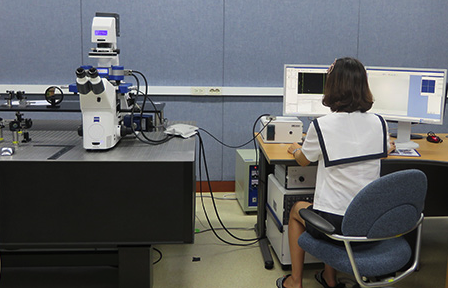 Established in 1976 for R&D of chemical technology in Korea, the Korean Research Institute of Chemical Technology (KRICT) has helped drive the growth of the country“s chemical industry. The focus is on the development of world-class key technologies. There are four key research fields: the development of eco-friendly chemical process technology; the development of high value-added green chemical materials; the discovery of...
Established in 1976 for R&D of chemical technology in Korea, the Korean Research Institute of Chemical Technology (KRICT) has helped drive the growth of the country“s chemical industry. The focus is on the development of world-class key technologies. There are four key research fields: the development of eco-friendly chemical process technology; the development of high value-added green chemical materials; the discovery of...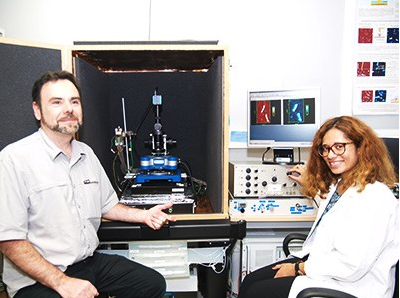 Drs Christophe Demaille and Agnès Anne from CNRS work in the Laboratoire d'Electrochimie Moléculaire at the Université Paris Diderot as Group Leaders of a research team aiming to probe electron transport and communication in nanometric biostructures. Their studies are performed at the single nano-object scale using combined atomic force (AFM)-Electrochemical (SECM) microscopy. In this combined microscopy technique, the tip acts...
Drs Christophe Demaille and Agnès Anne from CNRS work in the Laboratoire d'Electrochimie Moléculaire at the Université Paris Diderot as Group Leaders of a research team aiming to probe electron transport and communication in nanometric biostructures. Their studies are performed at the single nano-object scale using combined atomic force (AFM)-Electrochemical (SECM) microscopy. In this combined microscopy technique, the tip acts...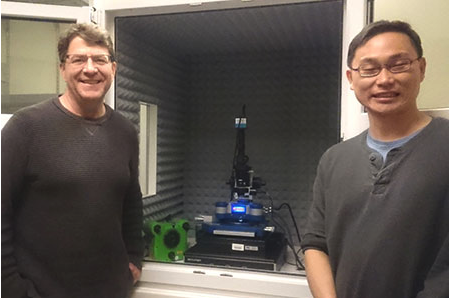 Dr. Phillip Messersmith is the Class of 1941 Professor in the Departments of Bioengineering and Materials Science and Engineering at the University of California at Berkeley. His research group is interested in understanding structure-processing- property relationships of materials in biological systems, and in using this information to inform the design, synthesis and application of biologically inspired synthetic materials used in a...
Dr. Phillip Messersmith is the Class of 1941 Professor in the Departments of Bioengineering and Materials Science and Engineering at the University of California at Berkeley. His research group is interested in understanding structure-processing- property relationships of materials in biological systems, and in using this information to inform the design, synthesis and application of biologically inspired synthetic materials used in a...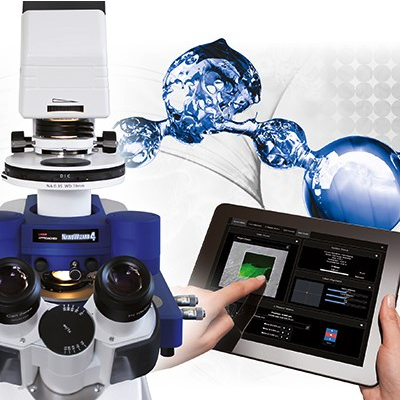 Working closely with their user base worldwide, JPK is pleased to announce their fourth generation AFM product, the NanoWizard® 4 BioScience AFM system. The pioneering manufacturers of nano solutions for life scientists have raised the bar in terms of technical performance to deliver a new applications-driven solution for users. It features fast scanning up to 70 Hertz line rate. Translated, this means users can follow dynamic processes with outstanding resolution...
Working closely with their user base worldwide, JPK is pleased to announce their fourth generation AFM product, the NanoWizard® 4 BioScience AFM system. The pioneering manufacturers of nano solutions for life scientists have raised the bar in terms of technical performance to deliver a new applications-driven solution for users. It features fast scanning up to 70 Hertz line rate. Translated, this means users can follow dynamic processes with outstanding resolution...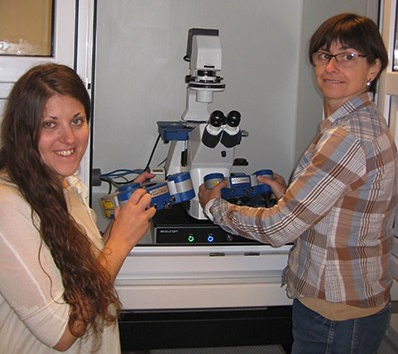 Dr Yves Dufrêne is a senior research fellow who is leading the Nanobio Team at UCL, Université catholique de Louvain. His research is at the cross-roads of nanotechnology and microbiology where the goal is to gain insight into the nanometer-scale surface architecture and molecular interactions of microbes. Two main topics are: understanding the spatial organization of the cell wall and deciphering the molecular mechanisms of cell adhesion...
Dr Yves Dufrêne is a senior research fellow who is leading the Nanobio Team at UCL, Université catholique de Louvain. His research is at the cross-roads of nanotechnology and microbiology where the goal is to gain insight into the nanometer-scale surface architecture and molecular interactions of microbes. Two main topics are: understanding the spatial organization of the cell wall and deciphering the molecular mechanisms of cell adhesion...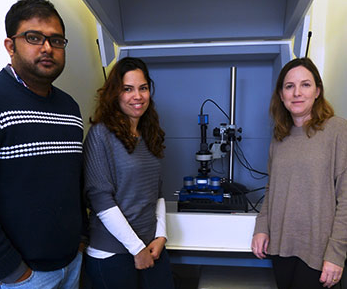 The Hebrew University of Jerusalem was founded in 1918. It is Israel's premier university as well as its leading research institution. It stresses excellence and offers a wide array of study opportunities in the humanities, social sciences, exact sciences and medicine. The university encourages multi-disciplinary activities in Israel and overseas and serves as a bridge between academic research and its social and industrial applications...
The Hebrew University of Jerusalem was founded in 1918. It is Israel's premier university as well as its leading research institution. It stresses excellence and offers a wide array of study opportunities in the humanities, social sciences, exact sciences and medicine. The university encourages multi-disciplinary activities in Israel and overseas and serves as a bridge between academic research and its social and industrial applications... 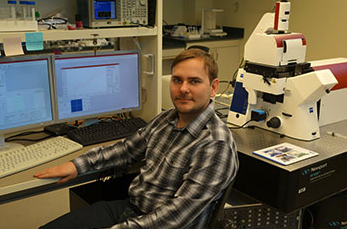 The Schieber Research Group is led by Jay Schieber, Professor of Chemical Engineering at the Illinois Institute of Technology where he is also Director of the Center for Molecular Study of Condensed Soft Matter. Current research focuses on the kinetic theory of macromolecules to model the rheological, thermodynamic and thermal behaviour of polymeric fluids. These models are then used to predict the properties of advanced materials...
The Schieber Research Group is led by Jay Schieber, Professor of Chemical Engineering at the Illinois Institute of Technology where he is also Director of the Center for Molecular Study of Condensed Soft Matter. Current research focuses on the kinetic theory of macromolecules to model the rheological, thermodynamic and thermal behaviour of polymeric fluids. These models are then used to predict the properties of advanced materials...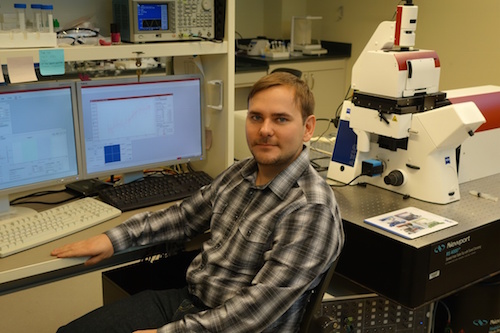
 Heading up this new organization is Dr Stefan Kaemmer who has been appointed General Manager of US Operations. Respected German technology leaders, JPK Instruments, are pleased to announce the opening of the first USA-based offices. With more than twelve years supplying nanoscale solutions worldwide for researchers in the bio, life and materials sciences, JPK is to open their offices in Southern California to support users across the...
Heading up this new organization is Dr Stefan Kaemmer who has been appointed General Manager of US Operations. Respected German technology leaders, JPK Instruments, are pleased to announce the opening of the first USA-based offices. With more than twelve years supplying nanoscale solutions worldwide for researchers in the bio, life and materials sciences, JPK is to open their offices in Southern California to support users across the...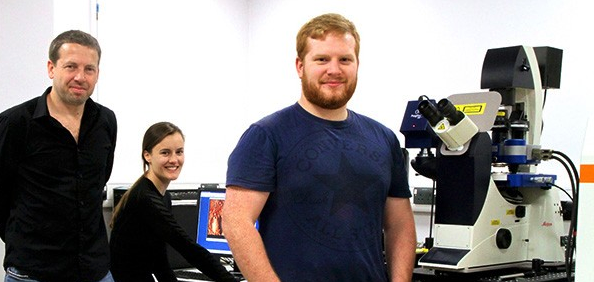 Dr Peter Dunstan is an associate Professor in the Department of Physics at Swansea University and a member of the University’s Centre for Nanohealth. His research utilizes state of the art techniques and instrumentation to increase the fundamental understanding of the structural, chemical, optical and electronic properties of materials on the nanoscale, and by doing so advance the future application of those...
Dr Peter Dunstan is an associate Professor in the Department of Physics at Swansea University and a member of the University’s Centre for Nanohealth. His research utilizes state of the art techniques and instrumentation to increase the fundamental understanding of the structural, chemical, optical and electronic properties of materials on the nanoscale, and by doing so advance the future application of those...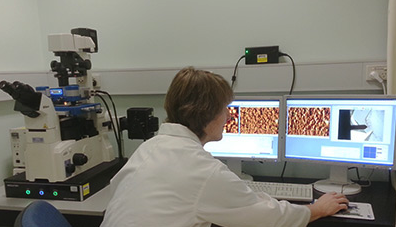 Research focuses on several areas. At a fundamental level, the group is interested in exploring the interactions that cause aggregation and assembly, in everything from nanoparticles, droplets and graphene to proteins and cells. This ranges from quite fundamental studies of things like the van der Waals force (of quantum origin) and electrical double-layer interactions, right through to unwinding protein molecules and the forces experienced by...
Research focuses on several areas. At a fundamental level, the group is interested in exploring the interactions that cause aggregation and assembly, in everything from nanoparticles, droplets and graphene to proteins and cells. This ranges from quite fundamental studies of things like the van der Waals force (of quantum origin) and electrical double-layer interactions, right through to unwinding protein molecules and the forces experienced by...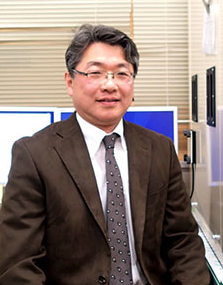 Tomoyuki Kawase is an associate professor at the Institute of Medicine and Dentistry at Niigata University. His field of expertise is tissue engineering about which he has published several key papers. Professor Kawase is interested to determine the optimal stiffness or elasticity of cell scaffolding materials. In addition, it is also important to demonstrate dynamic changes in cytoskeletal fiber formation in response to the mechanical property of scaffolds...
Tomoyuki Kawase is an associate professor at the Institute of Medicine and Dentistry at Niigata University. His field of expertise is tissue engineering about which he has published several key papers. Professor Kawase is interested to determine the optimal stiffness or elasticity of cell scaffolding materials. In addition, it is also important to demonstrate dynamic changes in cytoskeletal fiber formation in response to the mechanical property of scaffolds... 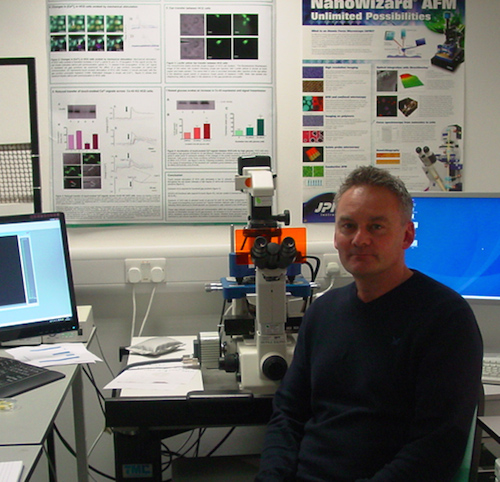 Dr Paul Squires and Dr Claire Hills from the School of Life Sciences (SLS) at the University of Warwick have international expertise in cell biology, signalling and endocrinology. They are using the JPK CellHesion® 200 system (funded by Diabetes UK) to nurture multi-disciplinary research between SLS and the School of Engineering (Dr K-K Liu) in addition to external collaborations, e.g. Professor Peter Jones (King’s College London). The innovative nanotechnology is being used to explore a range of problems in biomedicine, biology and pharmacokinetics related to the field of energy homeostasis and diabetes...
Dr Paul Squires and Dr Claire Hills from the School of Life Sciences (SLS) at the University of Warwick have international expertise in cell biology, signalling and endocrinology. They are using the JPK CellHesion® 200 system (funded by Diabetes UK) to nurture multi-disciplinary research between SLS and the School of Engineering (Dr K-K Liu) in addition to external collaborations, e.g. Professor Peter Jones (King’s College London). The innovative nanotechnology is being used to explore a range of problems in biomedicine, biology and pharmacokinetics related to the field of energy homeostasis and diabetes...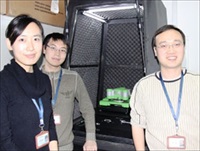
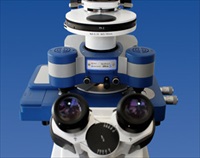 The boundaries for performance of analytical instrumentation are continually being pushed to the limits. In the world of atomic force microscopy, AFM, JPK Instruments have launched a new AFM system capable of delivering fast-scanning and super-resolution on a single instrument platform, the NanoWizard® ULTRA Speed AFM....
The boundaries for performance of analytical instrumentation are continually being pushed to the limits. In the world of atomic force microscopy, AFM, JPK Instruments have launched a new AFM system capable of delivering fast-scanning and super-resolution on a single instrument platform, the NanoWizard® ULTRA Speed AFM....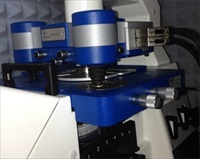
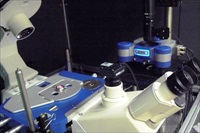 The CBS includes a research group focused on single molecule physics. Dr Pierre-Emmanuel Milhiet runs a team which applies AFM and advanced fluorescence microscopies (single molecule tracking and single-molecule localization microscopy or SMLM) in the study of both structure and dynamics of biological membranes. Speaking about his work, Dr Milhiet says "One of our aims is to decipher the molecular mechanisms involved in the lateral segregation of membrane components using artificial bilayers and intact cell membranes. Part of our activities is also to develop new methodologies and we have recently mounted a new setup combining a JPK AFM and home-made SMLM (especially PALM and STORM)...
The CBS includes a research group focused on single molecule physics. Dr Pierre-Emmanuel Milhiet runs a team which applies AFM and advanced fluorescence microscopies (single molecule tracking and single-molecule localization microscopy or SMLM) in the study of both structure and dynamics of biological membranes. Speaking about his work, Dr Milhiet says "One of our aims is to decipher the molecular mechanisms involved in the lateral segregation of membrane components using artificial bilayers and intact cell membranes. Part of our activities is also to develop new methodologies and we have recently mounted a new setup combining a JPK AFM and home-made SMLM (especially PALM and STORM)...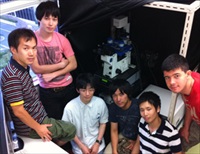
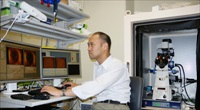
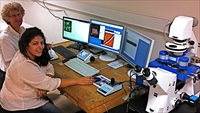 Dr Christian Marlière of the Institute of Molecular Sciences (ISMO) located at the Université Paris Sud, CNRS, Orsay leads a research team to study the dynamics and properties (mechanical, electrical and electro-chemical) of living bacteria in purely controlled physiological conditions at nanometer scale: motility or adhesion processes of bacteria on solid substrates, biofilms formation, the influence of light on moving properties of cyanobacteria, effects of antibiotics on bacterial membranes and biofilm etc....
Dr Christian Marlière of the Institute of Molecular Sciences (ISMO) located at the Université Paris Sud, CNRS, Orsay leads a research team to study the dynamics and properties (mechanical, electrical and electro-chemical) of living bacteria in purely controlled physiological conditions at nanometer scale: motility or adhesion processes of bacteria on solid substrates, biofilms formation, the influence of light on moving properties of cyanobacteria, effects of antibiotics on bacterial membranes and biofilm etc....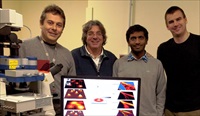
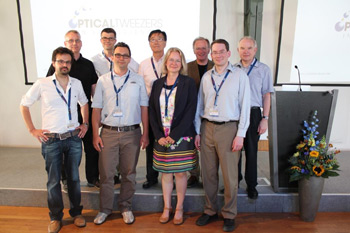 Held in Berlin, over 60 delegates enjoyed excellent presentations for an international group of speakers. This year's symposium was held on the 18th June in Berlin at the excellent Palisa De/Umspannwerk Ost. A sweltering Berlin welcomed over sixty scientists from around the world to discuss their results and share scientific knowledge in a relaxed and informal atmosphere. NanoBioVIEWS™ is the name of a series of international meetings initiated by JPK Instruments to further the scientific knowledge exchange on instrumentation and applications of nanotechnology in the life sciences...
Held in Berlin, over 60 delegates enjoyed excellent presentations for an international group of speakers. This year's symposium was held on the 18th June in Berlin at the excellent Palisa De/Umspannwerk Ost. A sweltering Berlin welcomed over sixty scientists from around the world to discuss their results and share scientific knowledge in a relaxed and informal atmosphere. NanoBioVIEWS™ is the name of a series of international meetings initiated by JPK Instruments to further the scientific knowledge exchange on instrumentation and applications of nanotechnology in the life sciences... 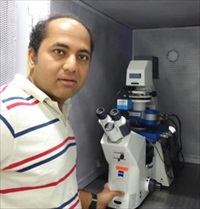 The Nano-mechanics group develops and uses novel techniques to understand molecular processes and has recently developed new instrumentation in the fields of single molecule force spectroscopy and correlation spectroscopy. There are three main areas of research: protein folding using AFM, measuring the mechanical properties of supported lipid bilayers and following the mechanical response of nano-confined fluids. This last area is performed on home-built instruments....
The Nano-mechanics group develops and uses novel techniques to understand molecular processes and has recently developed new instrumentation in the fields of single molecule force spectroscopy and correlation spectroscopy. There are three main areas of research: protein folding using AFM, measuring the mechanical properties of supported lipid bilayers and following the mechanical response of nano-confined fluids. This last area is performed on home-built instruments....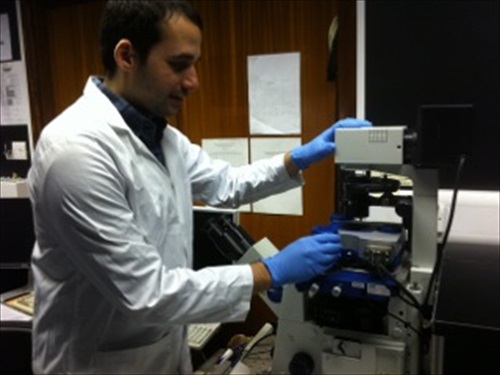 With a research interest in the development of new optical and spectroscopic methods for studying biomaterials, he is applying JPK's atomic force microscope (AFM) system, the NanoWizard®, and tip assisted optics module (TAO). The research programmes of the Nottingham Nanoscience group span a range of exciting and topical themes in state-of-the-art nanoscale science.
With a research interest in the development of new optical and spectroscopic methods for studying biomaterials, he is applying JPK's atomic force microscope (AFM) system, the NanoWizard®, and tip assisted optics module (TAO). The research programmes of the Nottingham Nanoscience group span a range of exciting and topical themes in state-of-the-art nanoscale science.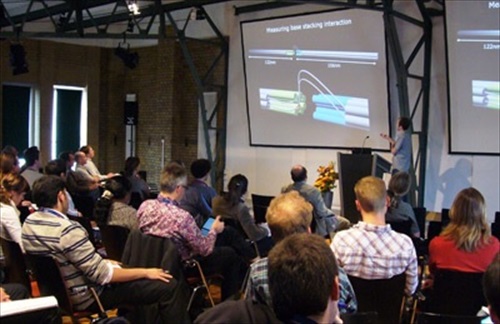 The symposium will be held on the 18th June 2013 in Berlin at the popular venue of the Palisa De/Umspannwerk Ost. This series of meetings continue to be highly regarded on the international life sciences meetings calendar with more than 100 scientists from around the world expected to come to Berlin to discuss their results and share scientific knowledge in a relaxed and informal atmosphere....
The symposium will be held on the 18th June 2013 in Berlin at the popular venue of the Palisa De/Umspannwerk Ost. This series of meetings continue to be highly regarded on the international life sciences meetings calendar with more than 100 scientists from around the world expected to come to Berlin to discuss their results and share scientific knowledge in a relaxed and informal atmosphere....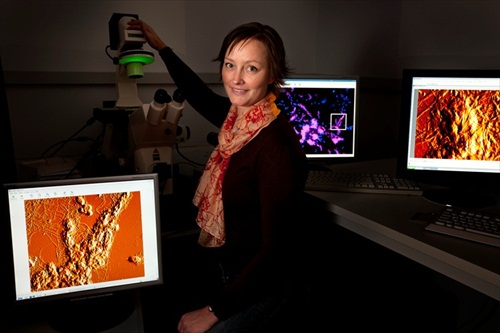
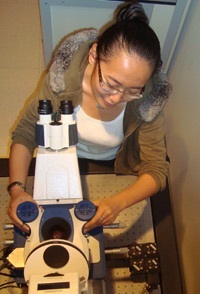 CIC biomaGUNE is a non-profit research organization created in 2006 to promote scientific research and technological innovation at the highest levels in the Basque Country. Dr Ralf Richter leads Laboratory 3 in the Biosurfaces Research Unit applying a number of techniques for surface nanostructure characterization and biofunctionalization to guide the assembly of molecules down to the nanometer-scale. For this characterization, his group has developed a toolbox of biophysical in-situ techniques including a quartz crystal microbalance with dissipation monitoring (QCM-D), atomic force microscopy (AFM), reflection interference contrast microscopy (RICM), ellipsometry and fluorescence methods...
CIC biomaGUNE is a non-profit research organization created in 2006 to promote scientific research and technological innovation at the highest levels in the Basque Country. Dr Ralf Richter leads Laboratory 3 in the Biosurfaces Research Unit applying a number of techniques for surface nanostructure characterization and biofunctionalization to guide the assembly of molecules down to the nanometer-scale. For this characterization, his group has developed a toolbox of biophysical in-situ techniques including a quartz crystal microbalance with dissipation monitoring (QCM-D), atomic force microscopy (AFM), reflection interference contrast microscopy (RICM), ellipsometry and fluorescence methods...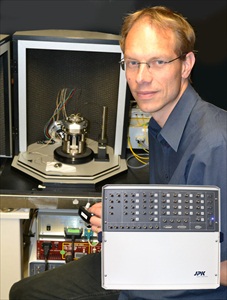 Lecturer at the London Nanotechnology Centre and the Department of Physics and Astronomy, University College London, Dr Bart Hoogenboom's main research interest is where nanotechnology tools may be used to study and manipulate single biomolecules. Specifically, he applies AFM as the only instrument that provides ~1 nm spatial resolution on large biomolecules that are "alive", or in more scientific terms, they are still functional and may be studied in the natural environment, i.e. aqueous salt solution...
Lecturer at the London Nanotechnology Centre and the Department of Physics and Astronomy, University College London, Dr Bart Hoogenboom's main research interest is where nanotechnology tools may be used to study and manipulate single biomolecules. Specifically, he applies AFM as the only instrument that provides ~1 nm spatial resolution on large biomolecules that are "alive", or in more scientific terms, they are still functional and may be studied in the natural environment, i.e. aqueous salt solution...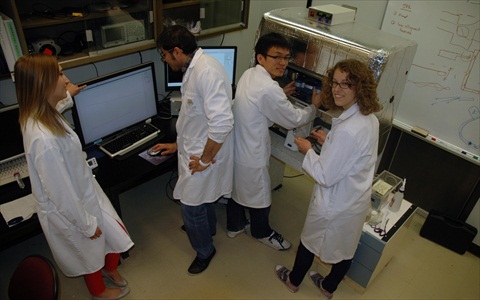 The Calgary Microscopy and Imaging Facility (MIF) is a world-class university-wide facility housing transmission electron microscopy (TEM), scanning electron microscopy (SEM), advanced light microscopy, atomic force microscopy (AFM), including single cell force spectroscopy (SCFS), and advanced image processing for three-dimensional electron and light microscopy, directed by Professor Matthias Amrein.
The Calgary Microscopy and Imaging Facility (MIF) is a world-class university-wide facility housing transmission electron microscopy (TEM), scanning electron microscopy (SEM), advanced light microscopy, atomic force microscopy (AFM), including single cell force spectroscopy (SCFS), and advanced image processing for three-dimensional electron and light microscopy, directed by Professor Matthias Amrein.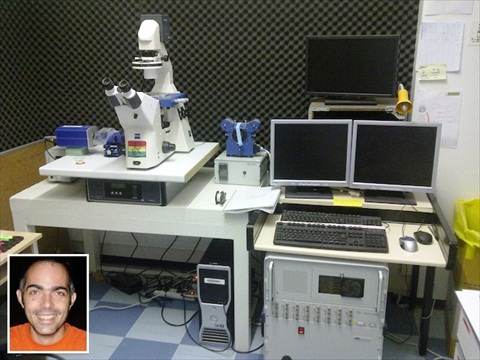 The Laboratory of Cell Adhesion and Inflammation is located in Marseille as part of the INSERM/CNRS complex on the Luminy campus. It is a multidisciplinary research unit comprised of investigators with backgrounds in physics, biology and medicine. Their aim is to adapt physical concepts and methodologies to the understanding of cell function, notably cell adhesion in the immune system, with the goal of applying the results of this fundamental research to relevant clinical problems...
The Laboratory of Cell Adhesion and Inflammation is located in Marseille as part of the INSERM/CNRS complex on the Luminy campus. It is a multidisciplinary research unit comprised of investigators with backgrounds in physics, biology and medicine. Their aim is to adapt physical concepts and methodologies to the understanding of cell function, notably cell adhesion in the immune system, with the goal of applying the results of this fundamental research to relevant clinical problems...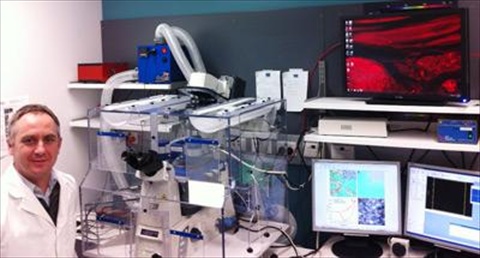 JPK Instruments, a world-leading manufacturer of nanoanalytic instrumentation for research in life sciences and soft matter, reports on the use of AFM to study the nanoscale interactions of biological systems at the Intelligent Polymer Research Institute (IPRI) and ARC Centre of Excellence for Electromaterials Science (ACES) of the University of Wollongong in the group of Dr Michael Higgins...
JPK Instruments, a world-leading manufacturer of nanoanalytic instrumentation for research in life sciences and soft matter, reports on the use of AFM to study the nanoscale interactions of biological systems at the Intelligent Polymer Research Institute (IPRI) and ARC Centre of Excellence for Electromaterials Science (ACES) of the University of Wollongong in the group of Dr Michael Higgins...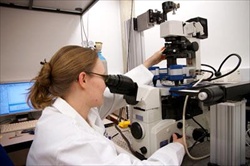 JPK Instruments, a world-leading manufacturer of nanoanalytic instrumentation for research in life sciences and soft matter, reports on the multi-faceted research projects of Dr Jochen Guck who runs simultaneous research at the Universities of Dresden and Cambridge. The biophysicist Dr. Jochen Guck has recently started his Humboldt Professorship of Cellular Machines at the Biotechnology Center of the TU Dresden (BIOTEC) while continuing to lead a team at the Cavendish Laboratory at Cambridge University (UK). His work at BIOTEC focuses on the development of new biophysical approaches for stem cell research, blood cell diagnostics and neuroregeneration...
JPK Instruments, a world-leading manufacturer of nanoanalytic instrumentation for research in life sciences and soft matter, reports on the multi-faceted research projects of Dr Jochen Guck who runs simultaneous research at the Universities of Dresden and Cambridge. The biophysicist Dr. Jochen Guck has recently started his Humboldt Professorship of Cellular Machines at the Biotechnology Center of the TU Dresden (BIOTEC) while continuing to lead a team at the Cavendish Laboratory at Cambridge University (UK). His work at BIOTEC focuses on the development of new biophysical approaches for stem cell research, blood cell diagnostics and neuroregeneration...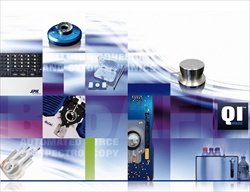 JPK Instruments, a world-leading manufacturer of nanoanalytic instrumentation for research in life sciences and soft matter, has released a new handbook of accessories for its family of SPM systems. Modularity is one of the most important parameters when selecting instrumentation for laboratory use today. Having the ability to add new tools and techniques for relatively low capital outlay while obtaining significant technical improvements is key in the world of SPM as most systems have multiple users, each with his or her own requirements be it in advanced research or in routine analysis...
JPK Instruments, a world-leading manufacturer of nanoanalytic instrumentation for research in life sciences and soft matter, has released a new handbook of accessories for its family of SPM systems. Modularity is one of the most important parameters when selecting instrumentation for laboratory use today. Having the ability to add new tools and techniques for relatively low capital outlay while obtaining significant technical improvements is key in the world of SPM as most systems have multiple users, each with his or her own requirements be it in advanced research or in routine analysis... JPK Instruments, a world-leading manufacturer of nanoanalytic instrumentation for research in life sciences and soft matter, reports on the research of Dr Clemens Franz at the DFG-Center for Functional Nanostructures in Karlsruhe. Dr Clemens Franz leads a group of researchers at the DFG-Center for Functional Nanostructures at Karlsruhe Institute of Technology where he works on expanding the use of AFM for cell biological applications. AFM has a strong advantage over other microscopy techniques. Samples can be imaged directly without prior preparation, such as staining or fixation...
JPK Instruments, a world-leading manufacturer of nanoanalytic instrumentation for research in life sciences and soft matter, reports on the research of Dr Clemens Franz at the DFG-Center for Functional Nanostructures in Karlsruhe. Dr Clemens Franz leads a group of researchers at the DFG-Center for Functional Nanostructures at Karlsruhe Institute of Technology where he works on expanding the use of AFM for cell biological applications. AFM has a strong advantage over other microscopy techniques. Samples can be imaged directly without prior preparation, such as staining or fixation...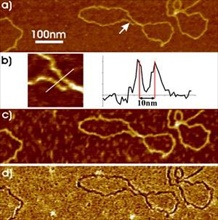 JPK Instruments, a world-leading manufacturer of nanoanalytic instrumentation for research in life sciences and soft matter, reports on a keynote paper in Nano Letters where Dr Nikolai Severin and his co-workers from the group of Professor Jürgen P. Rabe have applied JPK's NanoWizard®II Ultra system to improve their understanding of the properties of graphene...
JPK Instruments, a world-leading manufacturer of nanoanalytic instrumentation for research in life sciences and soft matter, reports on a keynote paper in Nano Letters where Dr Nikolai Severin and his co-workers from the group of Professor Jürgen P. Rabe have applied JPK's NanoWizard®II Ultra system to improve their understanding of the properties of graphene...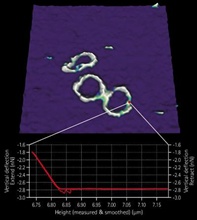 JPK Instruments, a world-leading manufacturer of nanoanalytic instrumentation for research in life sciences and soft matter, announce exciting new quantitative imaging capabilities for the recently launched NanoWizard®3 AFM system. QI™ is the new quantitative imaging mode from JPK. It has been developed to make AFM imaging easier than ever before. With QI™, a force curve-based imaging mode, the user has the full control over the tip-sample force at every pixel of the image. There is no need for setpoint or gain...
JPK Instruments, a world-leading manufacturer of nanoanalytic instrumentation for research in life sciences and soft matter, announce exciting new quantitative imaging capabilities for the recently launched NanoWizard®3 AFM system. QI™ is the new quantitative imaging mode from JPK. It has been developed to make AFM imaging easier than ever before. With QI™, a force curve-based imaging mode, the user has the full control over the tip-sample force at every pixel of the image. There is no need for setpoint or gain...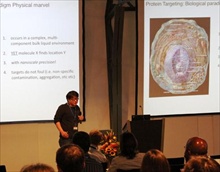 JPK Instruments recently hosted their tenth annual international symposium on the applications of scanning probe microscopy (SPM) and optical tweezers. Held this month in the historic Umspannwerk Ost in Berlin, the meeting brought together more than 100 scientists from around the world. The combination of papers and posters inspired excellent discussions as attendees presented their results and shared scientific know how in a relaxed and informal atmosphere...
JPK Instruments recently hosted their tenth annual international symposium on the applications of scanning probe microscopy (SPM) and optical tweezers. Held this month in the historic Umspannwerk Ost in Berlin, the meeting brought together more than 100 scientists from around the world. The combination of papers and posters inspired excellent discussions as attendees presented their results and shared scientific know how in a relaxed and informal atmosphere...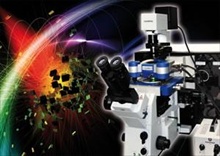 JPK Instruments, a world-leading manufacturer of nanoanalytic instrumentation for research in life sciences and soft matter, continue to expand its family of high performance research systems with the announcement of the availability of the NanoWizard® 3 NanoOptics AFM system....
JPK Instruments, a world-leading manufacturer of nanoanalytic instrumentation for research in life sciences and soft matter, continue to expand its family of high performance research systems with the announcement of the availability of the NanoWizard® 3 NanoOptics AFM system....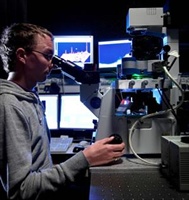 JPK Instruments, a world-leading manufacturer of nanoanalytic instrumentation for research in life sciences and soft matter, reports on the research and technique development activities of the Institute of Photonic Technology (IPHT) in Jena under the direction of Dr Volker Deckert...
JPK Instruments, a world-leading manufacturer of nanoanalytic instrumentation for research in life sciences and soft matter, reports on the research and technique development activities of the Institute of Photonic Technology (IPHT) in Jena under the direction of Dr Volker Deckert...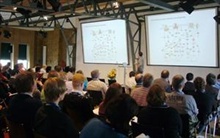 JPK Instruments are happy to announce that registration is now open for the tenth annual international symposium on the applications of scanning probe microscopy (SPM) and optical tweezers. The symposia will be held on the 5-6th October 2011 in Berlin focusing on applications developments in life sciences. These meetings continue to be highly regarded on the international life sciences meetings calendar. More than 100 scientists from around the world are expected to come to Berlin to discuss their results and share scientific knowledge in a relaxed and informal atmosphere...
JPK Instruments are happy to announce that registration is now open for the tenth annual international symposium on the applications of scanning probe microscopy (SPM) and optical tweezers. The symposia will be held on the 5-6th October 2011 in Berlin focusing on applications developments in life sciences. These meetings continue to be highly regarded on the international life sciences meetings calendar. More than 100 scientists from around the world are expected to come to Berlin to discuss their results and share scientific knowledge in a relaxed and informal atmosphere... JPK Instruments, a world-leading manufacturer of nanoanalytic instrumentation for research in life sciences and soft matter is pleased to announce the appointment of Thomas Neicke and Dr. Elmar Hartmann as new members of the sales team...
JPK Instruments, a world-leading manufacturer of nanoanalytic instrumentation for research in life sciences and soft matter is pleased to announce the appointment of Thomas Neicke and Dr. Elmar Hartmann as new members of the sales team...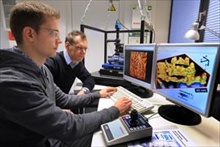 JPK Instruments, a world-leading manufacturer of nanoanalytic instrumentation for research in life sciences and soft matter, is pleased to report on the research work from the Chemical Physics group of Professor Robert Magerle of the Chemnitz University of Technology...
JPK Instruments, a world-leading manufacturer of nanoanalytic instrumentation for research in life sciences and soft matter, is pleased to report on the research work from the Chemical Physics group of Professor Robert Magerle of the Chemnitz University of Technology...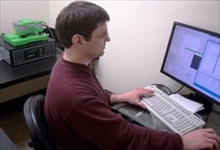 JPK Instruments, a world-leading manufacturer of nanoanalytic instrumentation for research in life sciences and soft matter, reports on the work from the Pharmaceutical Sciences Department of the Medical School at the University of Nebraska. The Department has selected the JPK ForceRobot® 300 system to extend their studies applying atomic force microscopy, AFM, in the measurement of single molecule force spectroscopy...
JPK Instruments, a world-leading manufacturer of nanoanalytic instrumentation for research in life sciences and soft matter, reports on the work from the Pharmaceutical Sciences Department of the Medical School at the University of Nebraska. The Department has selected the JPK ForceRobot® 300 system to extend their studies applying atomic force microscopy, AFM, in the measurement of single molecule force spectroscopy...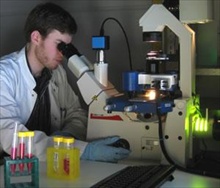 JPK Instruments, a world-leading manufacturer of nanoanalytic instrumentation for research in life sciences and soft matter, reports that the University of Leipzig has chosen the CellHesion® 200 system for their Institute of Experimental Physics I...
JPK Instruments, a world-leading manufacturer of nanoanalytic instrumentation for research in life sciences and soft matter, reports that the University of Leipzig has chosen the CellHesion® 200 system for their Institute of Experimental Physics I...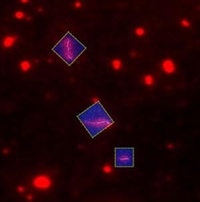 JPK Instruments, a world-leading manufacturer of nanoanalytic instrumentation for research in life sciences and soft matter, provides a unique software package to make the display of light microscopy images together with atomic force microscopy images a seamless exercise. This package is called DirectOverlay...
JPK Instruments, a world-leading manufacturer of nanoanalytic instrumentation for research in life sciences and soft matter, provides a unique software package to make the display of light microscopy images together with atomic force microscopy images a seamless exercise. This package is called DirectOverlay...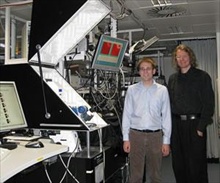 JPK Instruments, a world-leading manufacturer of nanoanalytic instrumentation for research in life sciences and soft matter, reports on the work from the Light Technology Institute at the Karlsruhe Institute of Technology (KIT) in Germany where the JPK NanoWizard® family of AFMs provide the backbone for topographic and optical research activities...
JPK Instruments, a world-leading manufacturer of nanoanalytic instrumentation for research in life sciences and soft matter, reports on the work from the Light Technology Institute at the Karlsruhe Institute of Technology (KIT) in Germany where the JPK NanoWizard® family of AFMs provide the backbone for topographic and optical research activities...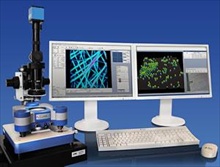 JPK Instruments, a world-leading manufacturer of nanoanalytic instrumentation for research in life sciences and soft matter, continues to expand its family of high performance research systems with the announcement of the availability of the NanoWizard® 3 NanoScience AFM system...
JPK Instruments, a world-leading manufacturer of nanoanalytic instrumentation for research in life sciences and soft matter, continues to expand its family of high performance research systems with the announcement of the availability of the NanoWizard® 3 NanoScience AFM system... JPK Instruments (JPK), a world-leading manufacturer of nanoanalytic instrumentation for research in life sciences and soft matter, is pleased to announce that JPK has received an award for its future technologies from the KfW bank group in cooperation with the German journal SUPERillu...
JPK Instruments (JPK), a world-leading manufacturer of nanoanalytic instrumentation for research in life sciences and soft matter, is pleased to announce that JPK has received an award for its future technologies from the KfW bank group in cooperation with the German journal SUPERillu...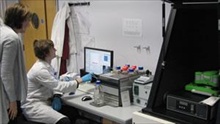 JPK Instruments, a world-leading manufacturer of nanoanalytic instrumentation for research in life sciences and soft matter, is pleased to report on the first work from the University of Nottingham who have chosen the ForceRobot® 300 system for their School of Pharmacy.
JPK Instruments, a world-leading manufacturer of nanoanalytic instrumentation for research in life sciences and soft matter, is pleased to report on the first work from the University of Nottingham who have chosen the ForceRobot® 300 system for their School of Pharmacy.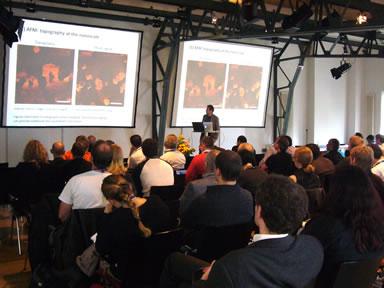 For the ninth year, JPK Instruments hosted the ninth annual international symposium on the applications of scanning probe microscopy (SPM) and optical tweezers. Held in the historic Umspannwerk Ost in Berlin in early October, the meeting focused on applications developments in life sciences once more attracting over 100 scientists from around the world.
For the ninth year, JPK Instruments hosted the ninth annual international symposium on the applications of scanning probe microscopy (SPM) and optical tweezers. Held in the historic Umspannwerk Ost in Berlin in early October, the meeting focused on applications developments in life sciences once more attracting over 100 scientists from around the world.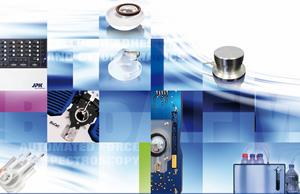 JPK Instruments, a world-leading manufacturer of nanoanalytic instrumentation in life sciences and soft matter report on the benefits of a broad accessory range to enable SPM researchers reach their goals. The 2010 accessories handbook is now available.
JPK Instruments, a world-leading manufacturer of nanoanalytic instrumentation in life sciences and soft matter report on the benefits of a broad accessory range to enable SPM researchers reach their goals. The 2010 accessories handbook is now available.